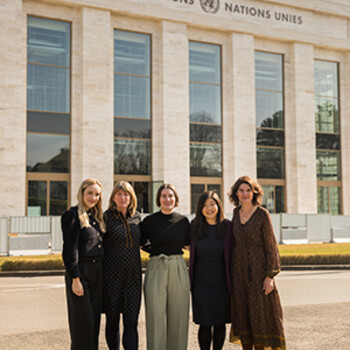Postgraduate Fellow Spotlight: Alyssa Yamamoto ’18

Alyssa Yamamoto ’18 reflects on her time so far pursuing a Robina International Human Rights Fellowship as Legal Advisor to the United Nations Special Rapporteur on the Promotion and Protection of Human Rights and Fundamental Freedoms while Countering Terrorism.
How long have you been working as a Robina Fellow and Legal Advisor to the United Nations Special Rapporteur on the Promotion and Protection of Human Rights and Fundamental Freedoms while Countering Terrorism?

I have had the privilege of working with the Special Rapporteur since July 2021.
What does your work with the Rapporteur entail?
Working for the Special Rapporteur involves a unique — and for me, ideal — combination of international law interpretation, human rights advocacy, political strategy, and civil society engagement. In addition to broadly supporting the mandate’s general responsibilities, each Legal Advisor to the Special Rapporteur is tasked with specific thematic and geographic portfolios. For my thematic portfolio, I have been leading the mandate's work assessing the human rights and rule of law implications of countering the financing of terrorism trends. For my geographic portfolio, I have been supporting the Special Rapporteur’s work on the United States, China, and Israel, among other countries.
For further context, the Special Rapporteur’s mandate was established in 2005 by the U.N. Commission on Human Rights, the predecessor to the U.N. Human Rights Council. Its role is to gather information on alleged State violations of human rights while countering terrorism, present regularly to the Human Rights Council and General Assembly on emerging challenges and recommendations, and provide technical assistance and substantive expertise to Member States and other entities upon their request. In addition, her mandate monitors and assesses national legislative and regulatory developments around both counterterrorism and preventing and countering violent extremism. The Special Rapporteur also works within the New York multilateral counter-terrorism architecture and is a member of multiple U.N. Working Groups within the U.N. Global Counter-Terrorism Coordination Compact.
Describe a project you’ve worked on.
A large part of my work has focused on documenting and tackling State misuse or abuse of counter-terrorism measures to target human rights defenders, civil society actors, and minorities. Most recently, I was able to explore these pressing challenges in my work supporting the Civil Society Workshop4 in Advance of the High-Level International Conference on Human Rights, Civil Society and Counter-Terrorism, which was co-sponsored by the Kingdom of Spain and the Special Rapporteur in May 2022. I also assessed related issues in the work that I led for the mandate’s June 2022 position paper on counterterrorism financing5. As part of this work, I have been involved in multiple consultations with a diverse range of civil society groups across continents. Getting to know these courageous and impassioned human rights defenders has been a true highlight of my fellowship.
What have been some of the challenges of your work?
A big challenge of our work is operating in highly securitized, human rights deficient, and civil society absent spaces, while also articulating to Member States and other entities the importance of human rights and gender mainstreaming and meaningful civil society participation. This requires clear argumentation of how a human rights and international law-compliant approach to counter-terrorism is not only obligatory as a matter of law but also empirically effective and necessary for the very purposes of countering terrorism and violent extremism and pursuing related rule of law, sustainable development, peacebuilding, and anti-corruption priorities. It has been a great learning experience for me to tailor this messaging to specific States and entities based on their unique strategic priorities.
How has the COVID-19 pandemic impacted your fellowship year ?
Despite the pandemic, I was lucky enough to split my fellowship year working with the Special Rapporteur's mandate in both New York and Geneva. My time in Geneva was also supported by a visiting fellowship with the Centre on Conflict, Development & Peacebuilding at the Graduate Institute of International and Development Studies and the Geneva Academy of International Humanitarian Law and Human Rights.
What experiences motivated you to pursue this opportunity?
Since my first job out of college working with a global health and development nonprofit that primarily operated in post-conflict settings, I have been interested in international human rights law and atrocity prevention. I was able to pursue these interests at YLS. For three years after graduating from YLS, I worked at an international law firm. There my representations involved inter-state proceedings before the International Court of Justice and U.N. Committee on the Elimination of Racial Discrimination, individual communications before the U.N. Human Rights Committee and Working Group on Arbitrary Detention, and plaintiff-side cases under the U.S. Alien Tort Statute and Torture Victim Protection Act. In those matters, I often saw how counter-terrorism and broader national security objectives can be invoked as pretext for human rights abuse. That piqued my interest in the national security and human rights interface and ultimately led me to the Special Rapporteur's mandate.
What goals have you set during your fellowship year?
My primary goal has been to build my substantive expertise in human rights mainstreaming and benchmarking in counter-terrorism and national security practice. A huge perk of my fellowship has also been working with and learning from an incredibly supportive and compassionate all-female team of lawyers, particularly given the male-dominated security spaces we often find ourselves in. I hope to carry forward this collaborative and mentoring dynamic in all of my future professional endeavors.


